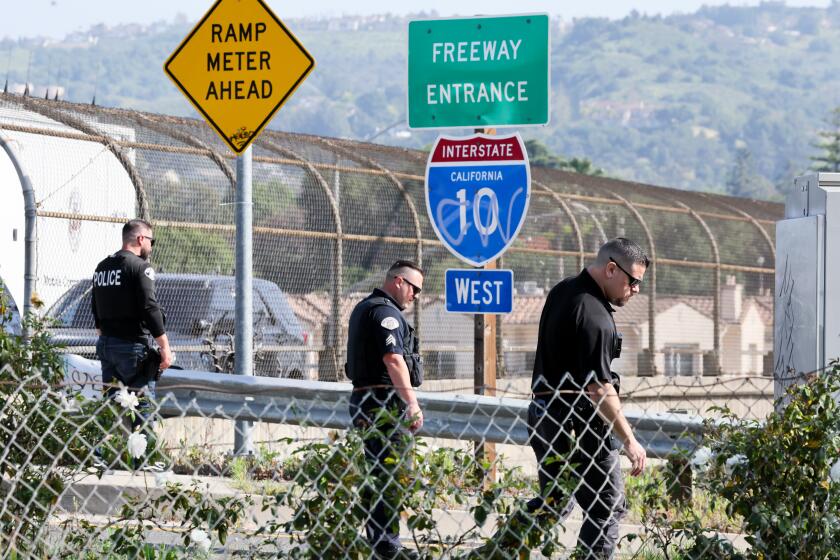A family’s grief magnified
Ricardo Cibrian Baltazar understood that a father’s role is to provide for his family.
So he scrimped and saved and invested more than $30,000 to buy his own truck.
Cibrian was at the wheel of that truck on the day he died. He was driving back home, to his wife, daughter and son.
His wife, Victorina Martinez, and their children, Samara and Nicolas, have lived ever since with the unending silence of his absence.
Cibrian can’t provide for his family anymore. He’s not there to play lucha libre wrestling games with his son or to pay for his daughter’s recent quinceañera party. He can’t help his wife study for and pass her U.S. citizenship test, as he did.
Cibrian became a small-business man to try to lift his family up from its humble circumstances. He dreamt of owning a home and sending his children to college.
“He didn’t want us living here, like this,” Martinez told me in the living room of her family’s two-bedroom Koreatown apartment.
The small accidental-death policy he left behind is just enough to cover the rent. And the family makes do on the $60 a day she earns as a housekeeper.
“He wanted something better for us,” Martinez said. “But here we are.”
It doesn’t have to be this hard for her.
Cibrian burned to death in a horrific chain-reaction crash involving 34 vehicles in a tunnel on the southbound 5 Freeway south of Santa Clarita.
The accident on Oct. 12, 2007, wasn’t Cibrian’s fault. Indeed, he was not among the many drivers in the tunnel that day who were driving too fast for the slick conditions, a California Highway Patrol investigation found.
The inquiry determined that the accident was caused by a speeding driver employed by a Georgia-based trucking company — at the wheel of a tractor-trailer with a faulty brake.
It’s the job of our civil courts to apportion responsibility and order monetary compensation for the victims’ families. But the courts are being cruel to this grieving California family.
An attorney representing Martinez has filed a wrongful-death lawsuit on the family’s behalf. But the pretrial wrangling has become a legal pile-up. With 34 vehicles and the state of California involved, there are so many lawyers in the courtroom it takes half an hour just to read all their names, said Timothy G. Tietjen, an attorney representing Martinez.
Saia Motor Freight Line, the Georgia trucking company, could have done the decent thing and simply offered a settlement to Martinez and the family of two others killed, driver Hugo Rodriguez and his 6-year-old son, Isaiah. It has not. And now a judge has imposed a stay that prohibits all the parties from moving the case forward.
“The cogs and wheels of justice are literally stuck,” Tietjen said.
The images of the burning tunnel dominated the news for several days in 2007. A stretch of the 5 was shut down as officials cleared the debris.
“I look at these and I try to understand,” Martinez told me as she sat on her living room floor with a stack of reports nearly a foot thick that detail the final moments of her husband’s life.
Cibrian was hauling merchandise for a 99-cent store. His Volvo truck was the 15th vehicle caught up in the crash. Another truck pinned his cab against a wall. And the ninth vehicle in the chain of collisions, a tanker truck filled with diesel, spilled its cargo nearby.
Moments before the fuel exploded in flames, Cibrian called his friend Agustin Hernandez to tell him what had happened.
In Martinez’s stack of documents is the bill that lists this final phone call and the time it lasted — four minutes.
“What was he thinking? Did he think about us?” Martinez asked me. “Did he think that he’d be leaving us alone? Did he suffer with that?”
Hours after the accident, Martinez drove to the scene. “I could see how the flames and smoke were still coming out of the tunnel,” she said.
Within a few days Caltrans had reopened the stretch of interstate. After a few weeks, the damaged tunnel had been repaired. The company that did the work got a $2.9-million bonus for finishing ahead of schedule.
Caltrans rushed to reopen the freeway, but no one has rushed to repair the lives of the devastated families left behind.
Saia has paid small settlements for the property damage, Tietjen said. But it’s resisted paying any wrongful-death claims. In an e-mail, a company spokeswoman told me she sympathizes with Martinez. But other speeding drivers bear some of the responsibility, she said, along with Caltrans officials because the tunnel was poorly designed.
In a perfect world, the trucking company would sit down with state officials and all the other attorneys and work out a settlement. But it’s in the company’s interest to move slowly.
“Delay is always on the side of the defense,” Tietjen said. “The longer they can avoid paying, the more interest they can save on the money they’ll have to pay.”
With or without a resolution, Father’s Day will never be easy for the children of Ricardo Cibrian.
On the days leading up to the holiday, Nicolas, 7, doesn’t like going to school. When his classmates ask what his father does, Nicolas answers, “He’s driving his truck.”
Ricardo Cibrian was just 39 at the time of his death. He was saving to buy a second truck. “He was the pillar of this household,” Martinez said. “Now I have to be.”
There’s a little village of lawyers meeting next week in an L.A. courtroom. Together they could make life easier for two L.A. families. All it takes is compassion.
More to Read
Start your day right
Sign up for Essential California for news, features and recommendations from the L.A. Times and beyond in your inbox six days a week.
You may occasionally receive promotional content from the Los Angeles Times.







